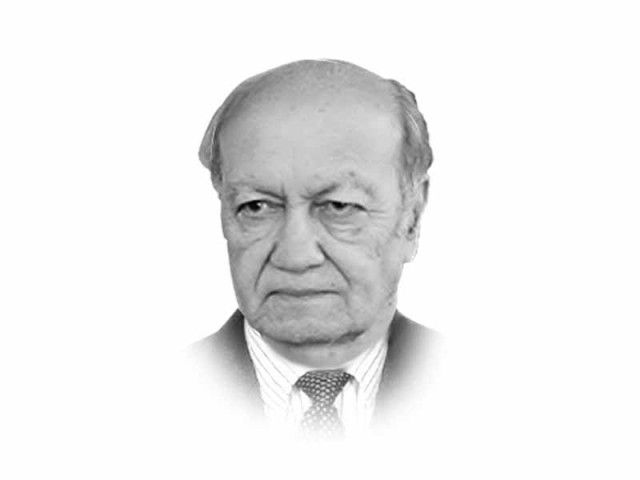Pros and cons of dharna
What needs to be assessed is whether dharna is the panacea to eliminate corruption

The writer is a retired lieutenant general of the Pakistan Army and a former federal secretary. He has also served as chairman of the Pakistan Ordnance Factories Board
The Panama leaks have brought into sharp focus the challenge of corruption, especially as the prime minister’s immediate family members are listed among those having accounts. Pakistan has yet to develop a culture where a leader steps down in the face of a serious crisis in which his person or direct family is alleged to be involved in dishonest practices. Nawaz Sharif takes the cover that since his name has not appeared in the Panama leaks, there is no case for his resignation. His sons live abroad and are managing their finances, being directly answerable to the respective governments. In mature democracies where leaders are more sensitive to public opinion, resignation would be the standard course of action; but this is not so in transiting democracies. Even in India, where democracy is well entrenched, rarely do politicians resign on the basis of mere allegations.

However, what needs to be assessed is whether dharna is the panacea to eliminate corruption. And whether it is a just approach when an opposition leader assumes the role of prosecutor, judge, jury and executioner and has a vested interest in capturing power. Has Imran Khan also foreseen the consequences of destabilising an already fragile state, in which non-democratic forces are well entrenched and never miss an opportunity to make a comeback? Already, some of these very groups are urging the law-enforcement authorities to play a bigger role. Will a country that has hardly any political resilience be able to absorb the shocks of sustained protests and still retain its democratic moorings? More likely, this movement will result in yielding additional space to law-enforcement authorities and tilt the balance, further strengthening their hold on the affairs of the state. The civilian government that is already weak in its governance will be so preoccupied in a fight for survival that its performance will continue to suffer.
This will be the outcome if judgments are going to be passed on the streets and the destiny of a nation determined by street power alone. A more rational approach for both the government and the opposition will be to agree on a terms of reference. This seems unlikely, as the government is not prepared to make the Panama leaks investigation PM-specific. The opposition, however, contends that the government is deliberately expanding the scope of the commission so as to dilute the focus on the prime minister and his family. A deadlock on this issue is most likely and perhaps this will then provide Imran Khan the rationale to launch the movement. Clearly, launching a campaign will contribute in building awareness against corruption, but merely protesting on the streets will not put an end to it. Curbing, or eliminating corruption requires institutional responses for which our institutions have to be strengthened and very little effort is being made in that area.
In the past, several attempts were made by our military rulers and politicians to reduce corruption through melodramatic measures. The dismissal of 350 bureaucrats by General Ayub Khan is one such example. General (retd) Pervez Musharraf also made attempts to cleanse the country of corruption, but he too failed miserably. On the contrary, to garner political support for legitimising non-democratic governance, most of these leaders co-opted politicians who had a blemished past. It is evident from all these attempts that without taking corresponding measures of improving governance, eliminating politics of patronage and strengthening institutions, corruption will not be reduced in any significant manner.
Besides, corruption is not confined to Panama leaks alone as there are several other offshore banks operating worldwide. Then there are other forms of corruption that we experience daily in our lives. Politicians at the centre and in the provinces keep filling government jobs with relatives and friends, setting aside merit and other professional practices. This, too, is corruption and needs to be dealt with seriously.
Imran Khan has alluded to the PNA movement of the late 1970s wherein all political parties put up a united front against Bhutto that ultimately led to his ouster. We need to remind ourselves that the movement, instead of strengthening democracy, facilitated the return of non-democratic rule that lasted over a decade. It is likely that history may repeat itself if opposition parties resort to anarchic politics. They could land themselves in a much worse position than they already face.
Alongside the positive aspect in building awareness against corruption, there should be realisation of the downside and risks that are associated with rocking the state structure and the political process. The greatest challenge for Imran Khan will be to steer the protest so that it does not cross the minimum stability threshold. But is this possible? A saner approach would be to use parliament and the judicial process to pressure the government and leaders into being more accountable and transparent. Parliament should take the lead in identifying methods to eliminate corruption. The next elections, too, will provide people an opportunity to reach a verdict on their leaders’ abilities and integrity. Will Imran Khan have the patience to pursue these options, or will he opt for the dharna?
Published in The Express Tribune, July 13th, 2016.
Like Opinion & Editorial on Facebook, follow @ETOpEd on Twitter to receive all updates on all our daily pieces.














COMMENTS
Comments are moderated and generally will be posted if they are on-topic and not abusive.
For more information, please see our Comments FAQ